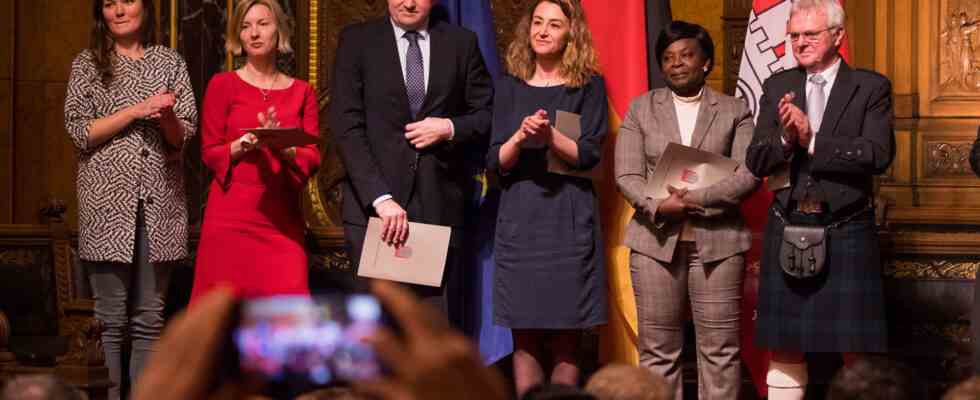interview
Status: 11/25/2022 7:13 p.m
Naturalization is not just about political participation, says migration expert Petra Bendel in an interview tagesschau.de. Fewer legal hurdles are needed, but also a new “body language of the state”.
tagesschau.de: How do you rate the federal government’s plans to make naturalization easier?
Petra Bendel: The federal government is thus implementing a project of the coalition agreement. There are far-reaching plans for citizenship law reform. In principle, naturalization should take place more quickly – after five instead of eight years. With special integration services even after three years. And she generally wants to accept multiple nationalities. As the Advisory Council on Integration and Migration, we welcome this.
The legal reforms can lead to more people being naturalized and no longer being excluded from political participation. It’s also about appreciation. However, it is not only the legal reforms that are important, but also the way in which they are implemented, the “body language” of the state. How are those entitled to be addressed, how do the authorities implement the reforms in practice, and how do we then celebrate these naturalizations – in other words, how much appreciation do we show our new fellow citizens?
To person
Petra Bendel heads the research area Migration, Flight and Integration at the Friedrich-Alexander-University Erlangen-Nuremberg. She is chairwoman of the Advisory Council on Integration and Migration.
Nine million people without a German passport
tagesschau.de: The hurdles for naturalization are to be lowered – this includes the shorter minimum length of stay, but also, for example, a hardship regulation for language acquisition. Is this a contemporary adaptation?
bendel: The adjustment is definitely up-to-date because the number of naturalizations has been stagnating for almost two decades. They bob around between 100,000 and 110,000 naturalizations a year – that’s about 2.5 percent. Measured against the proportion of persons entitled to claim in Germany, this is very little.
At the end of last year, around 13 percent of the adult population in Germany did not have German citizenship. That’s a good nine million people. More than five million of them have been living in Germany for more than ten years and thus already fulfill a key requirement for naturalization.
Multiple states as an opportunity
tagesschau.de: Why is this a problem?
bendel: A great many people who live here are thus excluded from the full participation that is only guaranteed by citizenship. Above all, this includes the opportunity to participate in elections. And vice versa, a democracy legitimizes itself through elections.
tagesschau.de: If more than five million people already meet the criteria, why don’t you already have German citizenship?
bendel: Research results show that the condition of giving up one’s previous citizenship when naturalizing is a major hurdle. If a new law now allows multiple citizenship, it can be expected that many entitled persons will be encouraged to apply for German citizenship.
tagesschau.de: For older people, other hurdles such as the knowledge test and the language certificate should also be removed. The draft by the Federal Ministry of the Interior states that this is “recognition of the lifetime achievements of the guest worker generation”. But it also applies to over 67-year-olds who haven’t been in Germany that long. What does that mean for the integration of these people?
bendel: The majority of this group comes from the so-called guest worker generation. We know that more than two thirds of them – almost a million people – have been living in Germany for more than 25 years. The average length of stay is even 31 years.
Germany behind Hungary in an EU comparison
tagesschau.de: There has also been criticism of the plans. For example, that the German passport is now becoming “junk goods”. What do you think?
bendel: German citizenship is still linked to clear requirements, such as a certain length of stay, the condition of impunity and knowledge of German. There are only a few small improvements now. I can’t see any “scams” there.
tagesschau.de: How does German naturalization law compare internationally?
bendel: In an EU comparison, Germany is in the last third – even behind Hungary. In 2020, only one person out of 100 foreigners living in Germany was naturalized. The EU average is two percent. Sweden is the clear leader – there are few naturalization requirements. Portugal and the Netherlands are also quite far ahead.
Other legislation for professionals
tagesschau.de: There is a major shortage of skilled workers in Germany. Immigration is often presented as a solution in this context. Will the planned naturalization rules help?
bendel: Not immediately, because acquiring German citizenship is usually not a priority for skilled workers. The issue is much more about making the immigration options as simple as possible, recognizing the qualifications you have brought with you with little bureaucratic effort and winning trainees from abroad for our dual system. The federal government has planned other legislation for this, which is currently being discussed under the name of opportunity card.

